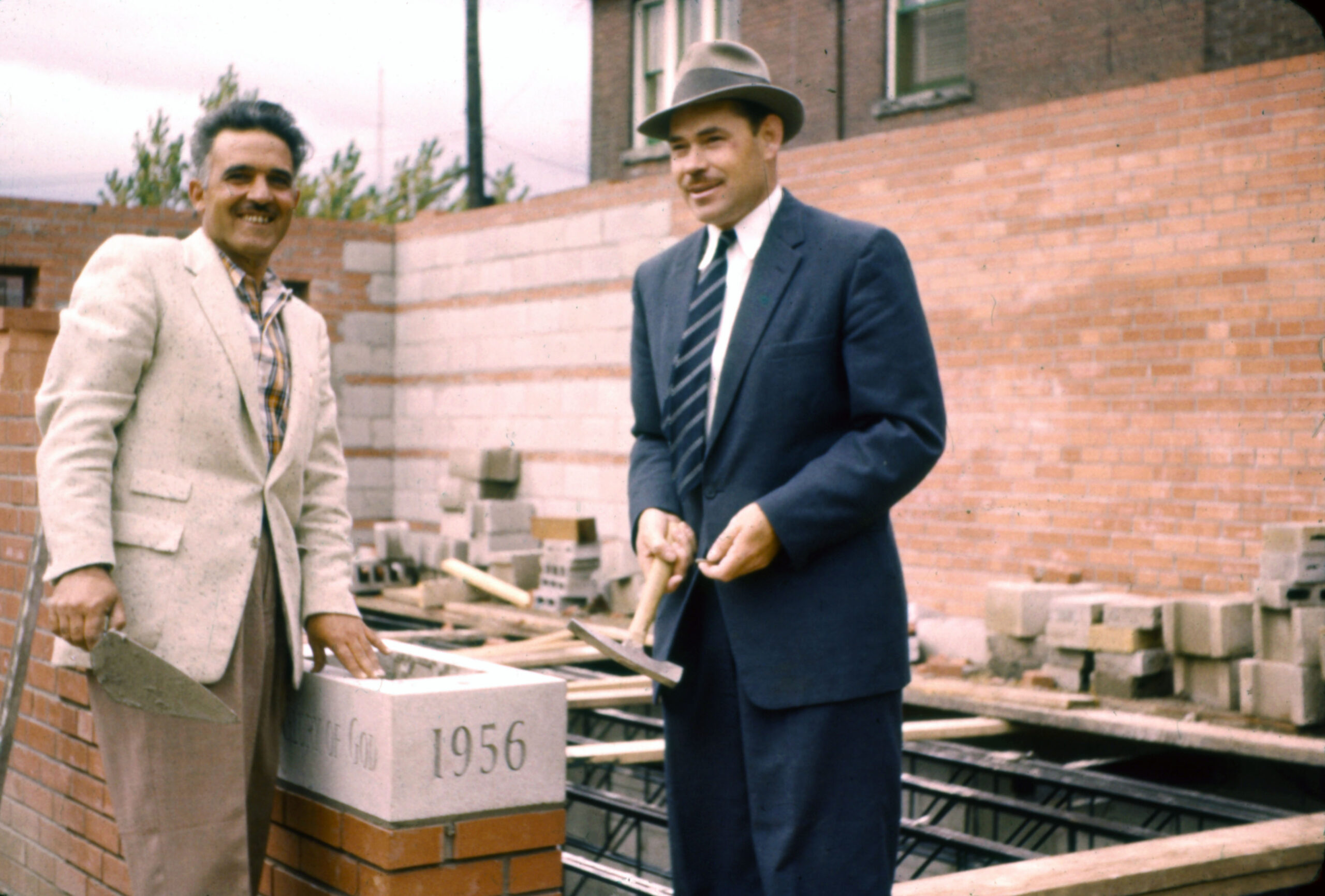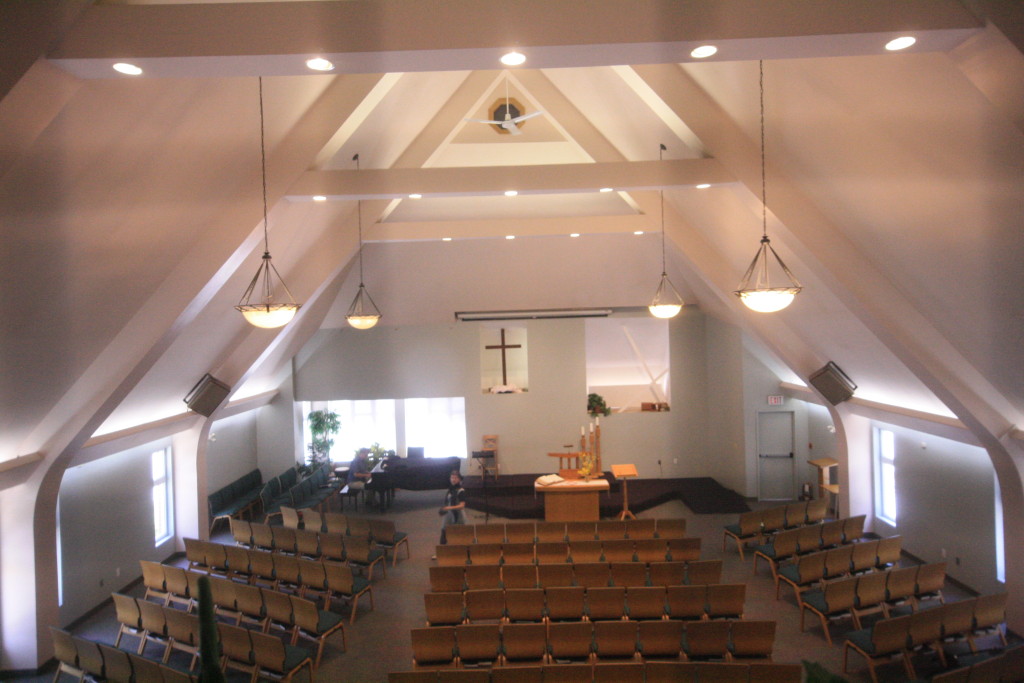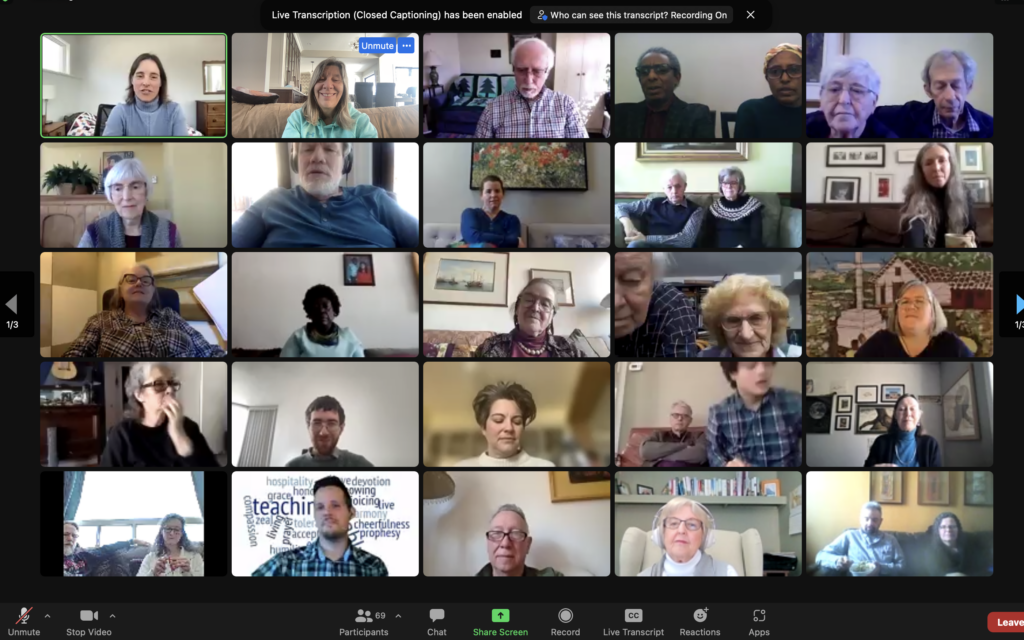Toronto United Mennonite Church was incorporated 75 years ago, after years of presence as a home-based congregation and then denominationally-funded mission church that met for some time at First Lutheran Church, on Bond St.
Mennonites who’d come to study or work in the big city longed to experience the shared faith and caring community they’d left behind in the smaller places in which they were raised. They willingly commuted from all over Toronto to worship together.
In the beginning, most members traced their roots to Mennonites whose ancestors migrated from the Netherlands and Germany to southern Russia and Ukraine in search of freedom to practise their faith as they chose – and then to Canada in the wake of political and social upheaval. Over the years, our congregation has become multicultural and we hail from five continents and speak many mother tongues. Many of us are first-generation Mennonites.

See also: Our story in our ‘stuff’
Some significant milestones in TUMC’s story
1930s Mennonites begin to come to Toronto seeking education and employment, most of them among the 21,000 Mennonites who came to Canada in the previous decade from today’s Ukraine. Groups begin to meet in private homes for Sunday worship services.
1942 As the group grows, it rents space in Bond Street Lutheran Church in downtown Toronto for services every second Sunday night. The Mission Board of the General Conference Mennonite Church (based in Newton, Kansas) becomes aware of this emerging congregation and assists in arranging and supporting visiting ministers. Supported by Waterloo-based United Mennonite Churches of Ontario, the Toronto United Mennonite Mission is born. The first business meeting is held August 30, 1942. Rev. Arnold Fast of Mountain Lake, Minnesota, is appointed the Mission’s first minister. A Founder’s Meeting is held on October 19, 1943.
1946 As the Mission grows, the congregation purchases a residence in Riverdale at 140 Victor Ave. The ground floor is renovated into a sanctuary, with the second floor serving as a parsonage. The pastor and family share the home’s only bathroom with congregants on Sundays. Attendance is reported at 40-50.
1947 Rev. H. Albert Claassen of Beatrice, Nebraska, takes over as minister in January and shepherds the congregation toward incorporation.
1948 The Mission becomes incorporated as Toronto United Mennonite Church on June 17, with 13 official members. H.A. Claassen leaves after 18 months and Rev. Frank P. Dyck of Saskatchewan.
1950 Bill Dick, a Canadian Mennonite Bible College grad from Leamington, Ontario, becomes pastor, beginning 11 years of consistent leadership as TUMC grows in numbers and activities.
1956 The church helps found Menno House, a residence for male university students, which operated until 1965. TUMC holds its first weekend retreat at Scarcliffe on Lake Muskoka, hosted by Victor and Hedwig Dyck, who own a historic lodge there. This becomes a treasured annual event over the next 20 years, when the Dycks retire to Waterloo, and is replaced by an annual retreat at Silver Lake, which continues to this day. The growing congregation also constructs a building at its current location at Queen Street E. and Lark Street, designed by young University of Toronto–trained architect Victor Heinrichs. The first service is held in an incomplete and still-windowless facility in December, with the congregation wearing full winter clothing.
1960s Rev. Dyck and various congregation members help create Silver Lake Mennonite Camp (near Sauble Beach). The church offers children’s clubs and grapples with how to serve what was then a low-income neighbourhood. The TUMC Peace Committee, along with Mennonite Central Committee (MCC), presents a Peace Booth at the Canadian National Exhibition (from 1960 to 1966). Later in the decade, it joins other area churches to sponsor an annual festival in support of MCC at Black Creek Pioneer Village. 1960s social unrest issues shake the congregation.
1961 Nicholas Dick, a former associate pastor in Saskattoon, becomes pastor. Building is finally fully finished and dedicated in June.
1967 The first German/English Advent Carol Sing is held, becoming an annual tradition that continues to this day.
1968 Helmut Harder becomes pastor on an interim basis.
1970 The congregation returns to a full-time pastorate with Darrell Fast, of Beatrice, Nebraska, becoming pastor.
1970s TUMC plays a significant role in M2/W2, a prison visitation ministry, as well as the Operation Springboard program. It also supports the MCC inner-city Toronto Service Project, the St. John’s Norway After School program and the Beaches Friendly Visitor program.
1973 TUMC partners with Danforth Mennonite Church to envision St. Clair O’Connor Mennonite Community, an innovative residential complex that combines townhouses for young families with seniors’ apartments and nursing home care. (Construction was completed in 1983.)
1974 TUMC celebrates 25 years since incorporation.
1977 TUMC hosts the annual meeting of the Canadian Conference of Mennonites at the University of Toronto and Bloor Street United Church, welcoming 389 delegates and others.
1978 TUMC begins to consider the future needs of seniors in the community. By 1981, it partners with Danforth Mennonite Church to build St. Clair O’Connor Community (SCOC), an innovative residential complex that combines townhouses for young families with seniors’ apartments and nursing home care. The building was completed in 1983 and many TUMC seniors made SCOC their home.
1979 TUMC takes a leading role in sponsoring Vietnamese “boat people,” settling 70 refugees in a single year, providing a model for MCC and other sponsoring churches, and beginning a decades-long involvement in refugee sponsorship.
1980s The church develops a caring and preaching team. meeting for the first time on October 5, 1980. TUMC holds its first ‘Guess Who’s Coming to Dinner’ event, held annually. The Ontario Mennonite Conference sponsors a Hispanic ministry in Toronto and, with TUMC’s support, the Mennonite New Life Centre of Toronto (a community-based settlement agency for newcomers to Canada) is founded in 1983. The New Life Faith Community, a Spanish-speaking congregation founded largely by Latin American newcomers, begins in 1987, eventually becoming the Mennonite New Life Church (Iglesia Menonita Nueva Vida). Both entities now share the building.
1986 TUMC members take a large role in creating the Mennonite Bicentennial Celebration at Harbourfront, recognizing 200 years of Mennonites in Canada. Two initiatives are born from this event, the Pax Christi Chorale and the Harbourfront Mennonite Christmas Festival, selling fair-trade crafts (under the Self Help Crafts and later Ten Thousand Villages label). The festival continues for 20 years, until the demise of Ten Thousand Villages. The chorale continues to perform. Also this year, Mississauga Mennonite Fellowship is founded as a spin-off from TUMC.
1986-7 Osiah Horst serves as interim pastor.
1987 Gary Harder, formerly pastor at First Mennnonite Church in Edmonton, becomes pastor. He begins a long-term practice of mentoring theological students with summer internships.
1990s A “baby boom” is accompanied by growth in adult membership and an increasing multicultural flavour. A mission and service committee is formed, as well as a club for junior-high youth. An associate pastor, Shannon Neufeldt, is hired to work with youth. TUMC takes a leading role in sponsoring and running the Mennonite Christmas Festival Sale, a weekend sale of fairly-traded crafts to benefit impoverished families around the world. Members join with people from other Mennonite congregations and MCC Ontario to establish Lazarus Rising, a ministry to homeless persons in Toronto. TUMC sponsors a large group of refugees from Kosovo.
1997 After years of pondering space issues and seeking a potential move, TUMC joins in a full building partnership with the Toronto Mennonite New Life Centre and Mennonite New Life Church of Toronto, with each holding a proportional stake in the property. The old building is torn down and a new multi-purpose facility erected on a slightly larger footprint. As in the 1950s, volunteers again provide a large part of the labour required, culminating in an “Urban Barn Raising” to finish the interior of the sanctuary in time for Christmas.

1998 TUMC celebrates 50 years as a congregation.
2000s Under the leadership of Bock Ki Kim, TUMC begins a Korean-language fellowship that meets during Sunday school hour while participating in TUMC worship services.
2001 Several TUMC people take the lead in developing a social service agency in Ukraine, in the former Mennonite village of Halbstadt (now known as Molochansk). The Mennonite Centre in Ukraine, located in a former Mennonite girls’ school, offers programs in health care, community living, music, culture, sports, education, farm assistance and church support to local Ukrainians.
The church engages in a difficult process of working through human sexuality issues.
Involvement in Lazarus Rising grows with member Doug Johnson Hatlem becoming a street pastor in collaboration with the downtown ministry of Sanctuary.
Church continues work with refugees from Colombia, Uganda, Zimbabwe and Iraq.
2005 With the church’s growing recognition of the special needs of youth, Jonathan Slater and Maureen Louth become pastors of youth ministry.
2007 On Gary Harder’s retirement, the congregation begins a process of visioning its future, with David Brubacher serving as interim pastor. (Four initiatives emerge from this process in 2008: becoming a more welcoming congregation, revitalizing our spiritual formation, defining our local ministry/mission, and a fresh vision for using the church’s properties on Queen and Lark.)
2009 Marilyn Zehr becomes lead pastor.
2012 Jonathan Slater and Maureen Louth complete their terms.
2013 Michele Rizoli becomes Associate Pastor, with special responsibilities for youth ministry. The congregation sponsors two Eritrean refugees and begins work on a vision, plan and fundraising for an addition to the church building.
2014 With a congregational decision and substantial pledges of monetary and volunteer support, work begins on a building space renewal and mission development program that includes an expanded lobby area, new offices and basement space, as well as a complete renovation of a church-owned house to become Aurora House, Toronto’s first long-term shelter for victims of human trafficking. A new board is formed to direct Aurora House, with programming assistance from one of our building partners, the Toronto Mennonite New Life Centre.
2015 As work is completed on the renovation of the future Aurora House and construction begins on the church renovation.
TUMC continues its refugee sponsorship tradition by preparing the way for a family awaiting sponsorship in Turkey.
2016 We welcome a refugee family of three from Iran in March.
Aurora House is dedicated in May and receives its first resident in June. TUMC celebrates the renovation of its own space in November. Here’s a video.
Marilyn Zehr departs and Michele Rizoli becomes pastor, working with a three-person Ministry Team for Youth and Children (Audrey Wichert, Trent Voth and Cedric Martin).
2017 TUMC gives full blessing to same sex marriages and joins the Brethren Mennonite Council (for LGBT interests).
2018 Continuing its response to the work of Canada’s Truth & Reconciliation Commission, TUMC begins working more intentionally at reconciliation with our Indigenous brothers and sisters, beginning with territorial acknowledgments in worship services, book study and other awareness raising activities.
2019 Peter Haresnape, a longtime member and former Christian Peacemaker Teams worker on Indigenous issues, is discerned as our second pastor, serving half-time, and joining Michele Rizoli, along with Audrey Wichert and Cedric Martin (Ministry Team for Youth and Children) on the church ministry team.
Four young women and two children from Eritrea are welcomed as sponsored refugees.

2020 The Covid-19 pandemic calls us to new ways of ministering to one another and our community. Our last in-person service (March 15) is livestreamed to about half of our community. Services then move to the Zoom platform, along with Sunday school classes, youth gatherings and committee meetings. We are saddened to experience the death of former pastor Nicholas Dick as the disease sweeps through the St. Clair O’Connor long-term care section. Creativity and new skills are fostered as we learn to create meaningful gatherings on Zoom and to adapt “Guess Who’s Coming for Dinner (Drinks),” the annual youth talent show, a Grade 12 graduation celebration, a kids’ scavenger hunt, the annual Advent Carol Sing, the Christmas Eve service, and many other customary activities to a virtual format. Members are connected with others to encourage regular “check-ins.” Quilters sew masks and blankets for homeless people forced out of shelters by the pandemic. Families collect beans or buttons in a jar to stand in for the loose-change offering, but members give generously by digital means. During summer, we celebrate the 100th anniversary of Mennonite Central Committee with a worship series on the theme of service. The Zoom format allows us to enjoy listening to a variety of guest speakers from a distance, and to reconnect with former members who have moved away. We treasure small-group breakouts and virtual “lobby time” to keep in touch and discuss important topics. Our pastors develop TUMC On Air, an occasional podcast with the theme of “Be At Rest.” Members “TAG” (targeted acts of generosity) each other with thoughtful surprises as an antidote to isolation. A creative Under One Roof joint campaign with the New Life Church helps raise money for roof repairs, culminating in a fun way with an online silent auction of goods and services. As vaccinations rise and restrictions ease, youth and children’s activities, including summer day/overnight camp, return in outdoor settings, and we hold outdoor churchwide gatherings, including an evening Taize service in July and a Sunday morning service in August. A reopening committee works diligently to prepare a safety plan and technical capability to begin hybrid services (Zoom+limited gathering in our building) in September.
2021 TUMC has to go fully online again as Covid forces another lockdown. Members continue to find new and creative ways to be the church.
2022 Things begin to open up, and members are able to worship at 1774 Queen by late winter with safety restrictions in place. Covid rules are relaxed by the fall.
The congregation expresses solidarity with Ukrainians in light of the February invasion by Russia, which has taken over the Mennonite Centre in Ukraine. We also mark Orange Shirt Day in solidarity with Indigenous people who suffered in the Indian residential schools, starting an annual tradition. We welcome a family of six from Eritrea.
2023 TUMC embraces a fully hybrid worship service. The congregation becomes a leading part of In This Together, a ministry seeking greater LGBTQ+ inclusion in Mennonite churches.
TUMC celebrates its 75th anniversary. A series of illustrated history banners created by Denise Voth and Elizabeth Giesbrecht, an anniversary quilt featuring the names of all current attendees, made by Carolyn Loewen, and photo collages by Doreen Martens are displayed around the building. An anniversary dinner is held on October 21 with 130 attendees, some coming from long distances, focusing on a presentation of TUMC history by Harold Thiessen. Gary Harder returns to the pulpit to preach at a thanksgiving service, followed by a Heritage Potluck celebrating the multicultural TUMC community of 2023, along with a slide show, games and a time of reminiscing.
2024 We express our solidarity with the suffering in Gaza/Palestine, with some members participating in a peace walk across Toronto.
Michele Rizoli retires after a weekend of celebrations November 16-17, including a hymn sing, comic roast, skits, games, musical performances and a slide show on Saturday, followed on Sunday by a festive worship service with a litany of blessing and release, a potluck and Scrabble tournament. In December, Christina Reimer becomes the third person in a row to be drawn from the congregation to serve in a pastoral role, becoming a part-time supply pastor alongside Peter Haresnape. Audrey Wichert continues in youth ministry.
